
When it comes to the most important appliances for the home, a refrigerator is at the top of the list. Refrigerators keep your food fresh and free from bacteria and spoilage. Refrigerators with freezers add the benefit of keeping food frozen as well, which can extend the shelf life since you can store items for up to a year, sometimes longer. Because the refrigerator is typically at the center of one of the most used, if not the most used rooms in the home, it needs be the right fit. This means a fridge needs to not only literally fit in the allotted space, but also be large enough to meet your family’s needs. It has to match the aesthetic as well.
There are so many options when it comes to refrigerators, from top or bottom freezer models to stainless steel, French door, ones with extra drawers, door-in-door models, and even smart models. It’s difficult to choose. In this buying guide, we’ll walk you through everything you need to know about refrigerators to help you find the best model for you and your family.
Table of Contents
- Types of refrigerators
- Choosing the right size and dimensions of a refrigerator
- The importance of energy efficiency
- Key features to look for in a refrigerator
- Smart refrigerators with advanced features
- Lifestyle considerations
- Aesthetic considerations
Types of refrigerators
The first question to address is what type of refrigerator you want. Once you choose among the available core options, you can then begin to narrow things down by features.
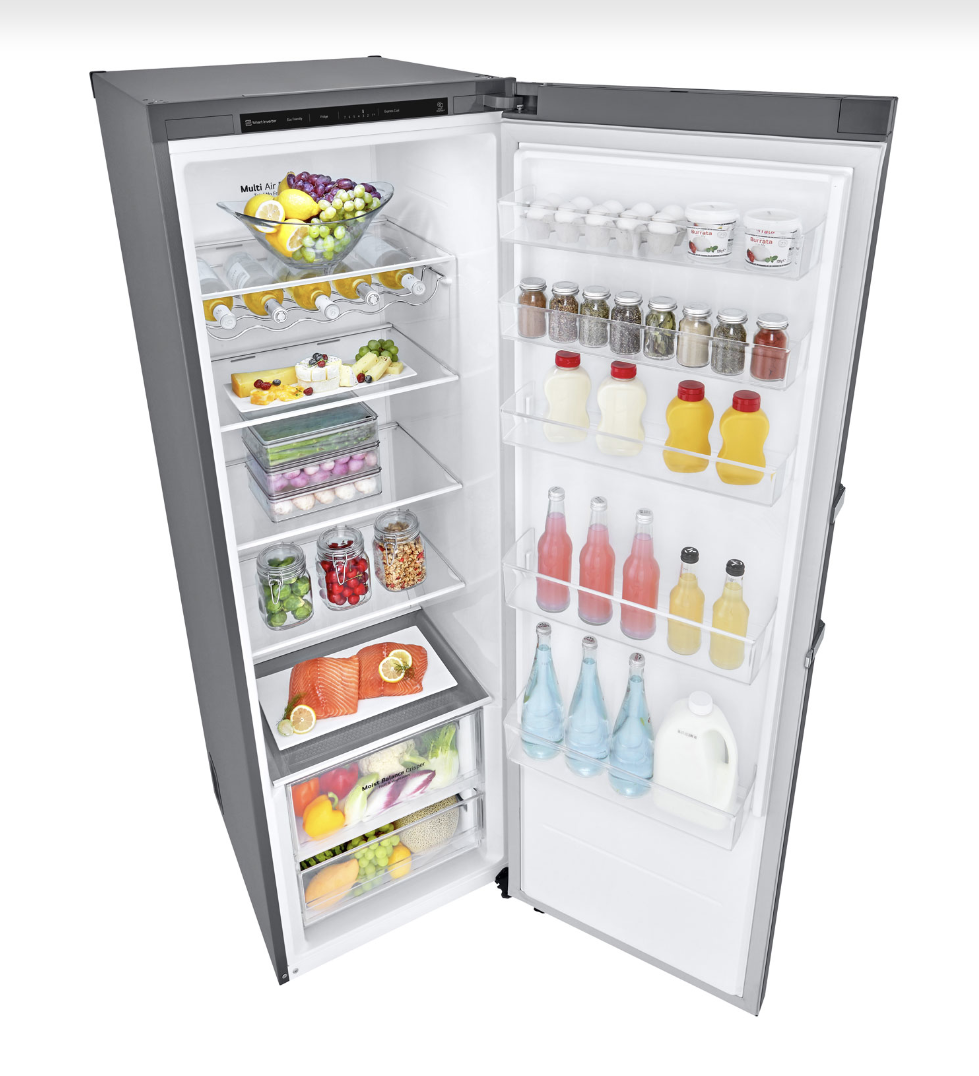
All-fridge refrigerators
An all-fridge refrigerator is just that: it only provides refrigerated storage and no freezer space. Measuring anywhere from under 24 inches up to more than 36 inches, the average interior size of these models is approximately 18 cubic feet, but you can find ones with up to 26 cubic feet inside. They provide ample storage space for fresh food. Typically, all-fridge refrigerators are designed for people who buy fresh groceries daily or several times a week and don’t often freeze anything or don’t like pre-cooked frozen foods. If you already have a chest freezer, you might rely on that for frozen items and prefer a cleaner look with an all-fridge refrigerator in the kitchen.
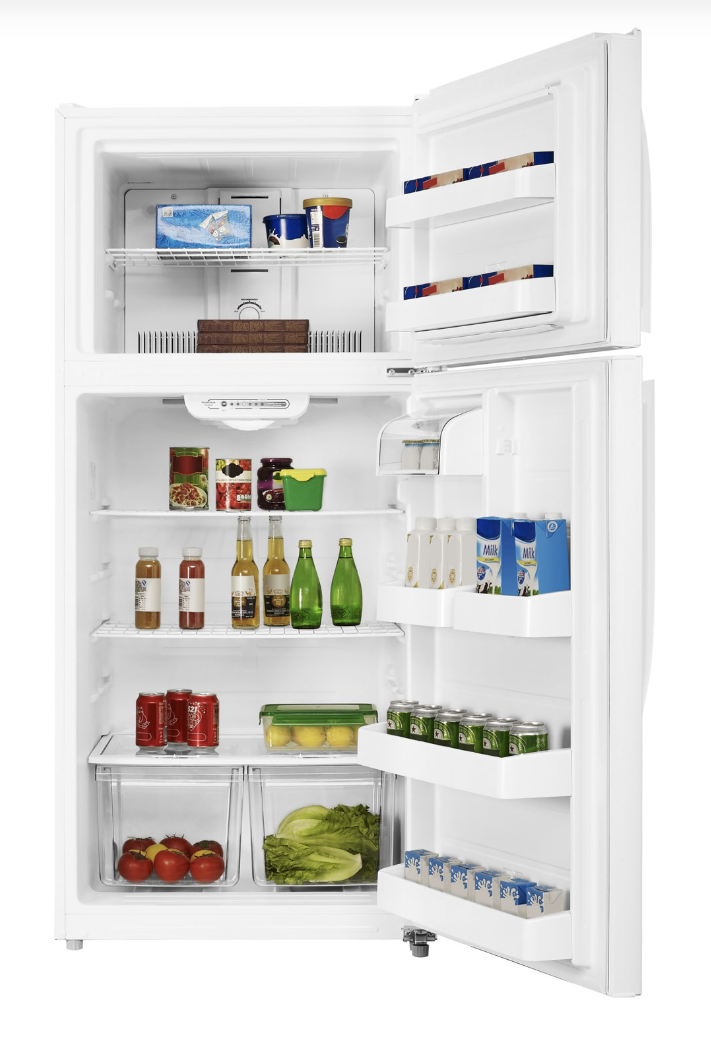
Top freezer refrigerators
As the name implies, a top freezer refrigerator is a refrigerator with a smaller freezer section on the top and a larger refrigerator area on the bottom. They usually range in size from 24 to 35 inches and have anywhere from 10 to 22.9 cubic feet of space inside. This is the type of fridge you will have seen decades ago, though newer models with this design still exist. If you tend to use a lot of frozen items, this design is preferred since you don’t have to bend down and dig to find what you want. This is ideal not only for convenience but for practical reasons as well, if you have back problems or elderly people in the home who have trouble bending down. Because of the more traditional design, top freezer refrigerators tend to be more affordable. But you may find that the freezer section is not as big as fridges that have bottom freezer drawers.
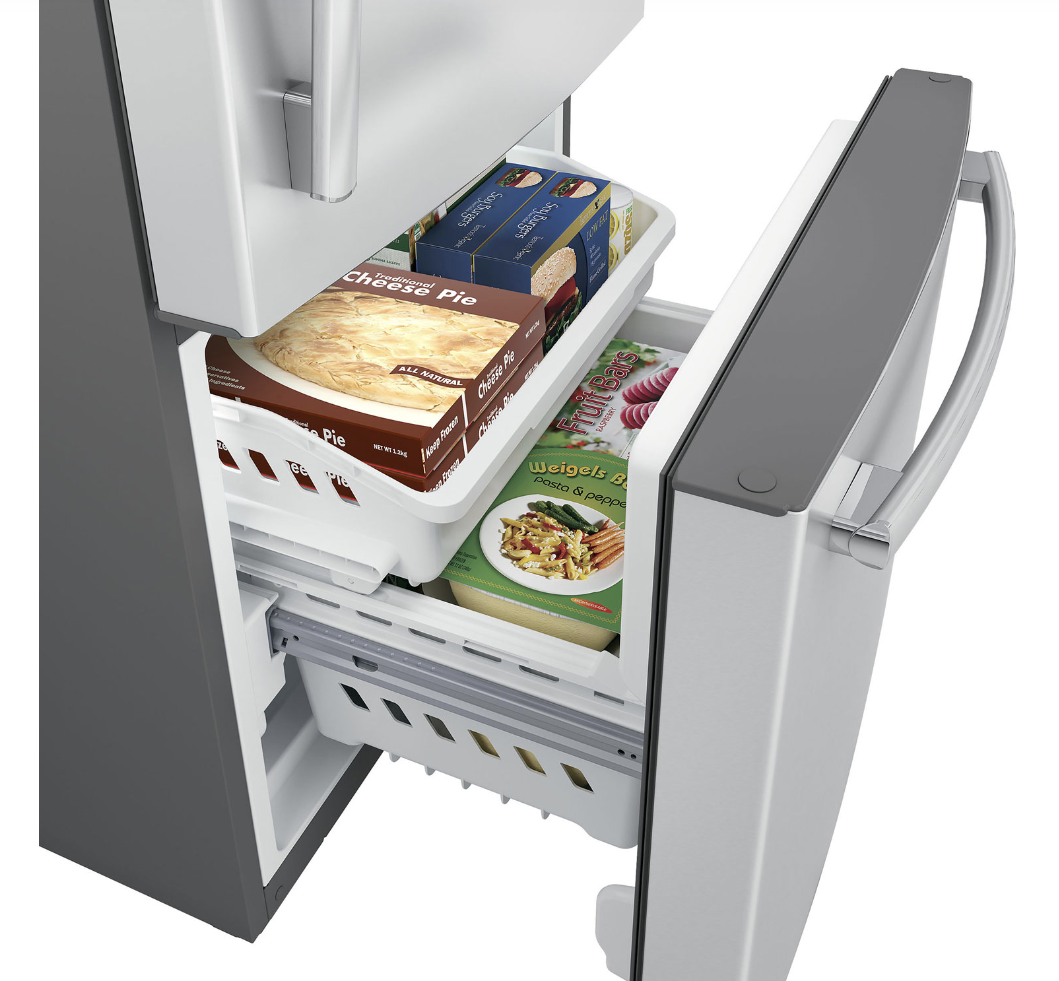
Bottom freezer refrigerators
This brings us to the next main type of refrigerator, which are bottom freezer refrigerators. As you might be able to guess, bottom freezer refrigerators have the main refrigerator compartment in the top two-thirds of the design with a freezer on the bottom. This allows you to easily access fresh groceries at eye level: even the lowest shelf will, depending on your height, be around waist level. Conversely, however, frozen items are down low which requires bending down to get them. If you don’t need to access frozen items as often as fresh, you might prefer this design. If you have younger kids who like to self-serve items like popsicles and other frozen treats, this design is appealing as well since the freezer will be easily accessible to them. Bottom freezer models range in size from less than 24 up to 36+ inches and have anywhere from 10 to 25 cubic feet of space inside.
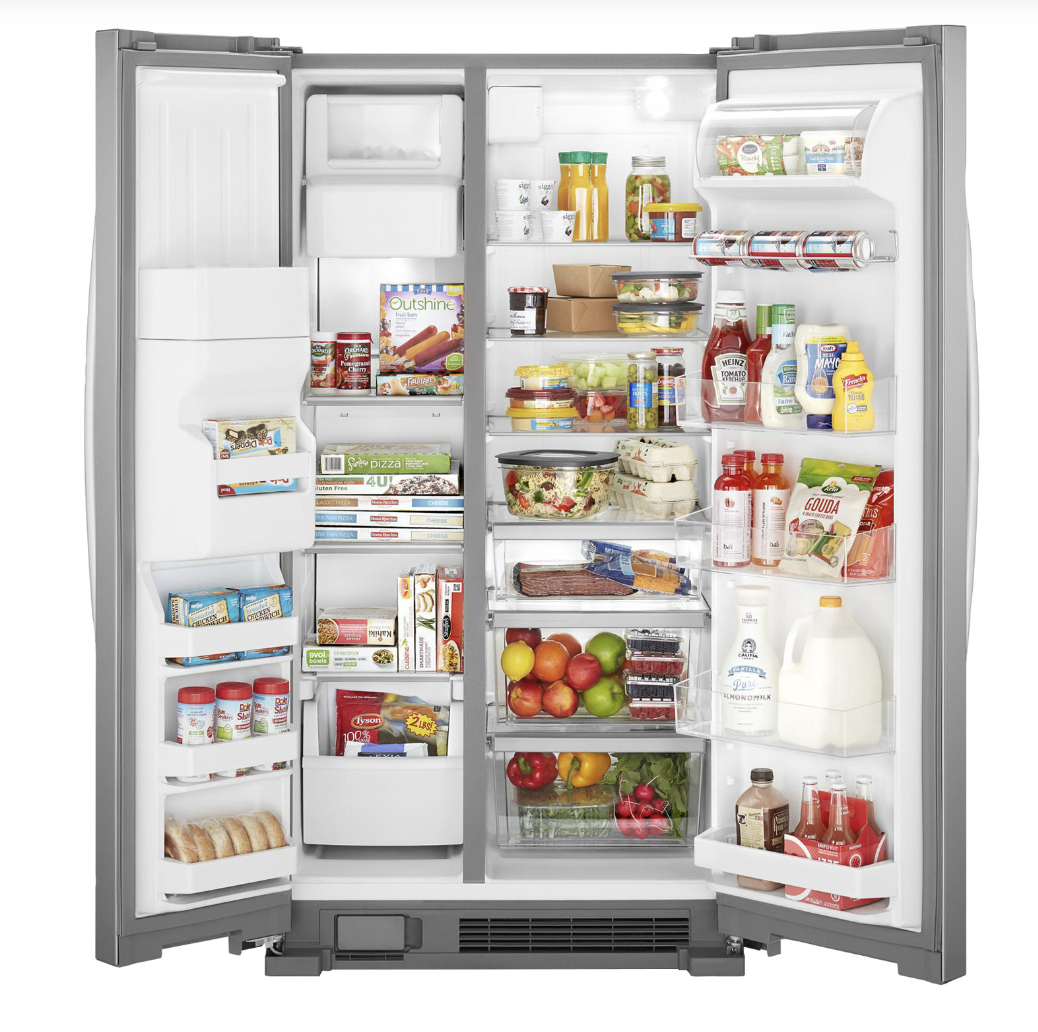
Side-by-side refrigerators
Side by side refrigerators, usually ranging in size from 24 to 36+ inches and offering from 16 up to 26 or more cubic feet of storage space, have become popular of late thanks to the convenience in their design. They are divided vertically such that you can access both the refrigerator and the freezer at the same level. Ideal for busy families that might require access to both equally (think fresh meats and cheeses for sandwiches for lunch then frozen pizza for dinner). Side-by-side refrigerators have doors that open both ways, so, keep this in mind when you’re considering placement, which we’ll discuss further in the next section. They also tend to be narrower so are a good option if you have a smaller kitchen and/or a narrow space with which to position the fridge.
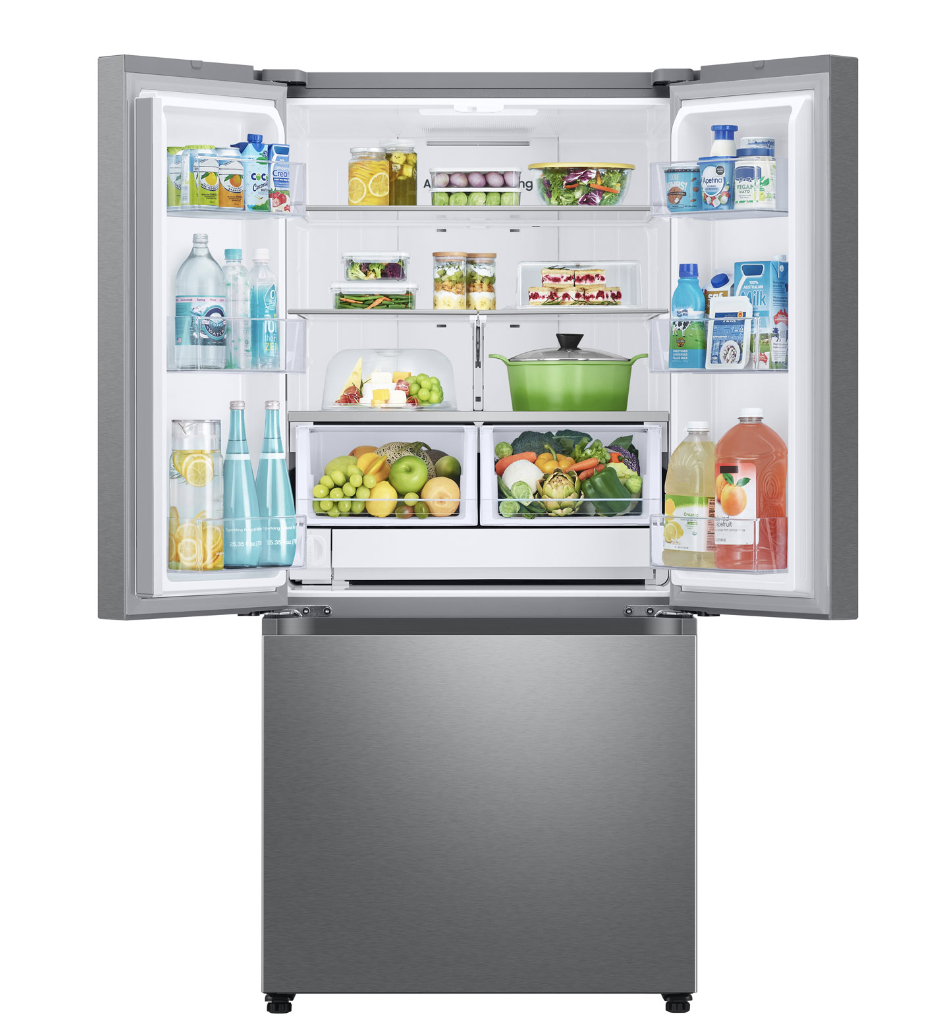
French door refrigerators
Arguably one of the most popular designs nowadays, French door refrigerators are a combination of side-by-side and bottom freezer designs. Ranging in size from 28 inches up to 36 inches (or larger) and from 16 to 26+ cubic feet of space, they have two main doors that open on either side to reveal different sides of the fridge along with a freezer drawer at the bottom you can pull out to access (some have two freezer drawers side by side). The benefit with these is that you can open the fridge halfway when needed without letting so much cold air out and maximizing energy. If you’re grabbing milk for your coffee, you can open the right-side door where you know the milk is. Open the left side, meanwhile, for eggs and bacon for breakfast. You can open both if you need to fit something large on a shelf, like a sheet cake or leftover tray of lasagna.
Compact/mini refrigerators
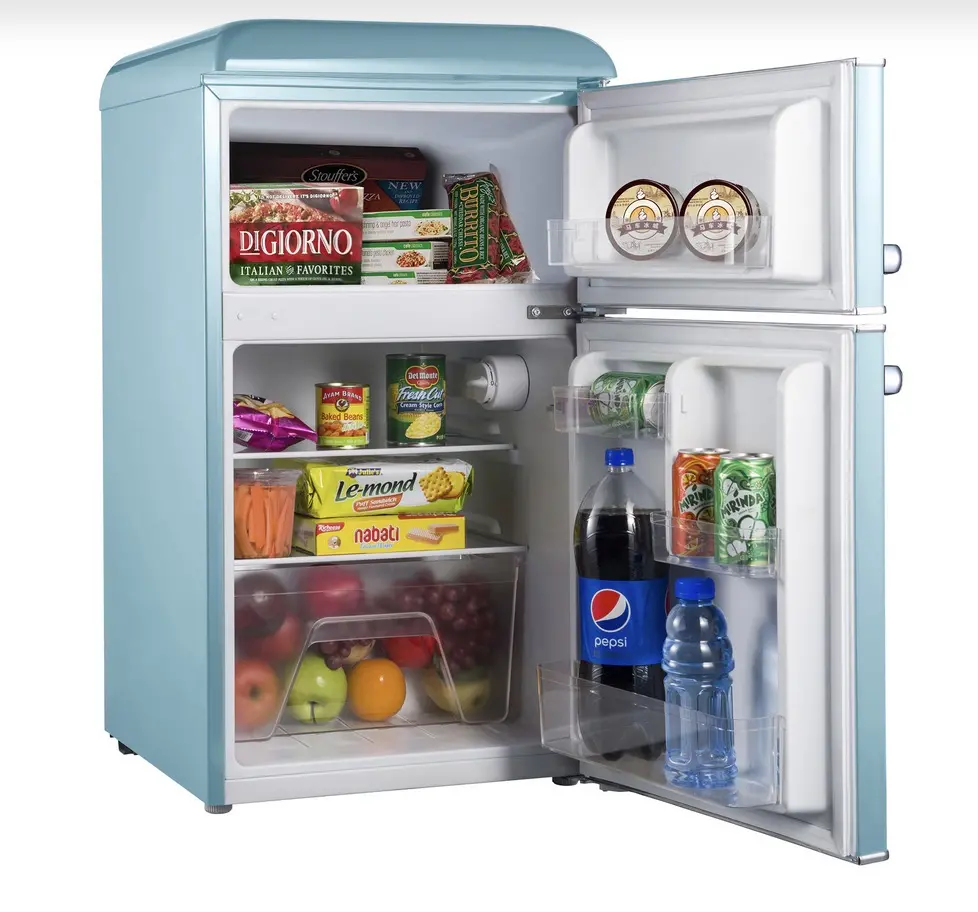
For smaller kitchens, apartments, dorms, and condos, or as a secondary fridge for the garage or basement, compact or mini refrigerators might fit the bill. These are smaller in size, from less than 10 inches up to 25 inches. They can hold a small amount of food, at least enough for a single person or couple. They offer basic cooling and a limited selection of features. For a single person, a couple, or a family that eats out most of the time, a compact refrigerator is worth considering. Some people also add a compact refrigerator to the home as a secondary fridge to hold things like drinks, large trays and cakes for entertaining, and more. For items that you need to keep cool for a day or two, and smaller spaces, they will do the trick.
Built-in refrigerators
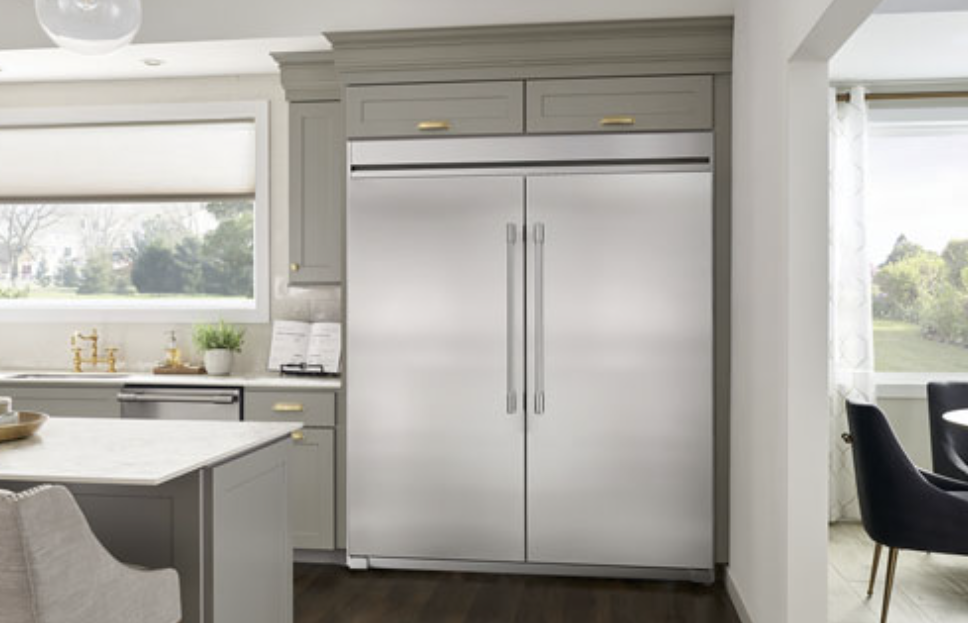
One of the latest design trends, especially with newer homes, is the built-in refrigerator, which is designed to blend seamlessly with your cabinets. Until you open the door, you might not even realize a fridge is hiding behind it. These tend to be much more expensive and, of course, require professional installation. But if you’re buying a new home or renovating your kitchen, it’s an option worth considering. These come in some of the styles noted above, most notably French door and side-by-side options.
Door-in-door refrigerators
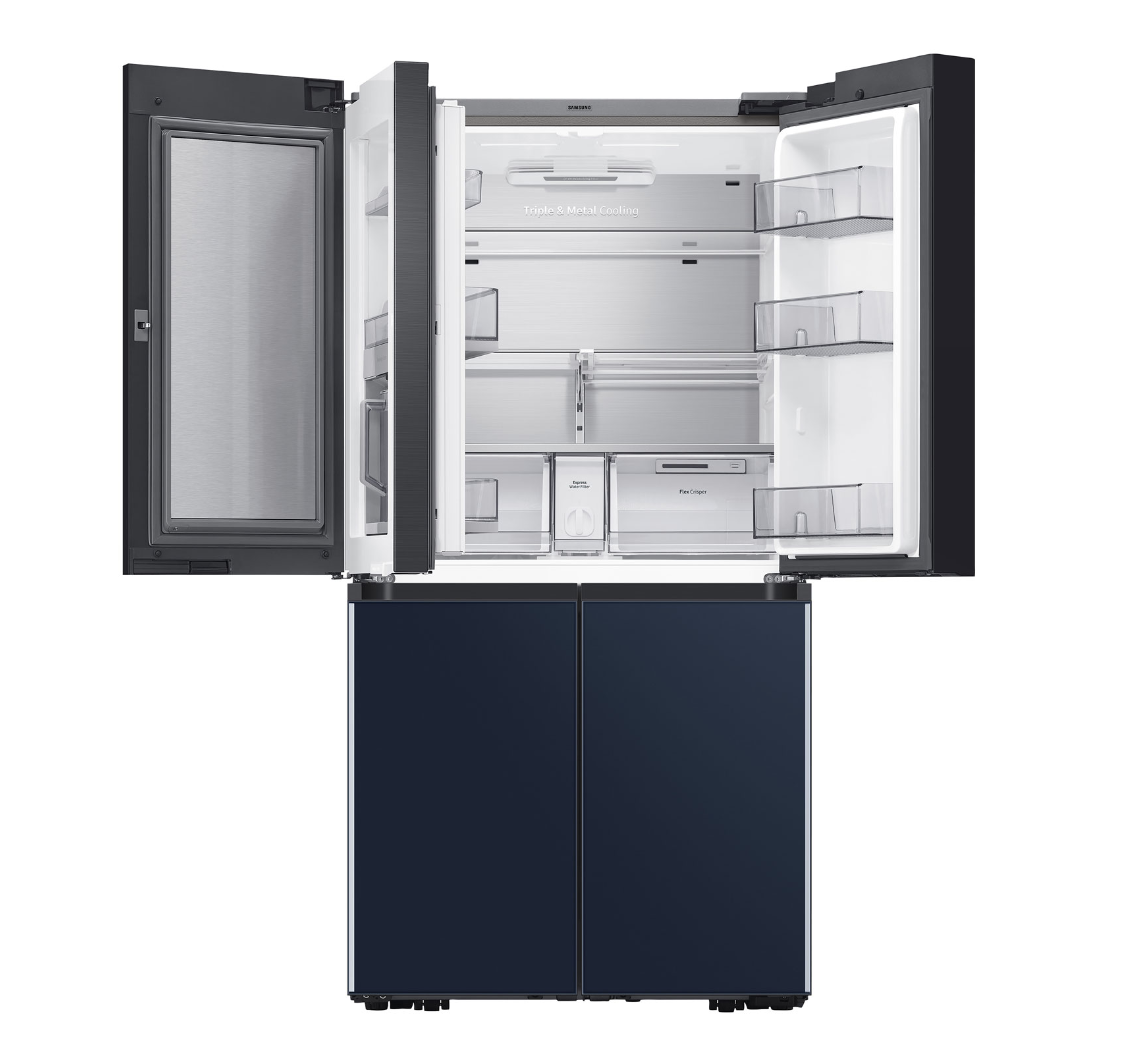
A subset of refrigerator types is the door-in-door fridge, which typically comes as an option with some French door refrigerators. These include secondary doors within each side door that you can open separately to access frequently used items, like drinks and condiments. The idea is that you can access items that don’t require intense cooling without having to open the main compartment. They also help maximize space, offering more shelves in the same space for holding things like ketchup, mustard, hot sauce, even eggs, juice boxes, snacks, and more.
5- and 6-door refrigerators
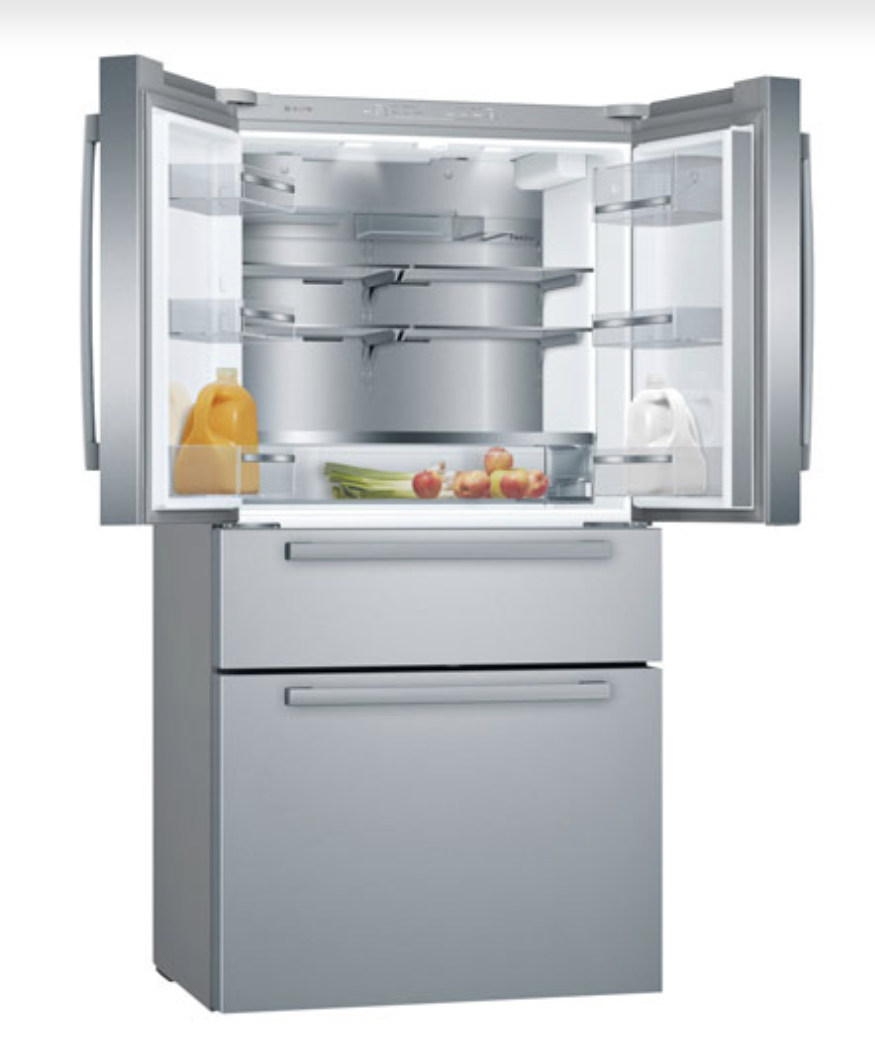
Another subset of the fridge type, again typically with French door refrigerators, is the 5-door fridge. These include the two main doors at the top and freezer drawer on the bottom, but also a fifth middle drawer. A 6-door fridge, meanwhile, will split the middle drawer into two separate, smaller drawers. The drawer typically has adjustable temperatures so you can use it for things like fresh meat and poultry, deli meats and cheeses, drinks, and other frequently accessed items. This keeps these separate from the main compartment while also offering easy access at waist level for adults and eye level for kids.
Counter depth refrigerators
These are a subset of either French door or side-by-side fridges and are designed to sit flush against the sides of counters and cabinets. They don’t protrude so you get the same real estate across an entire side of the kitchen.
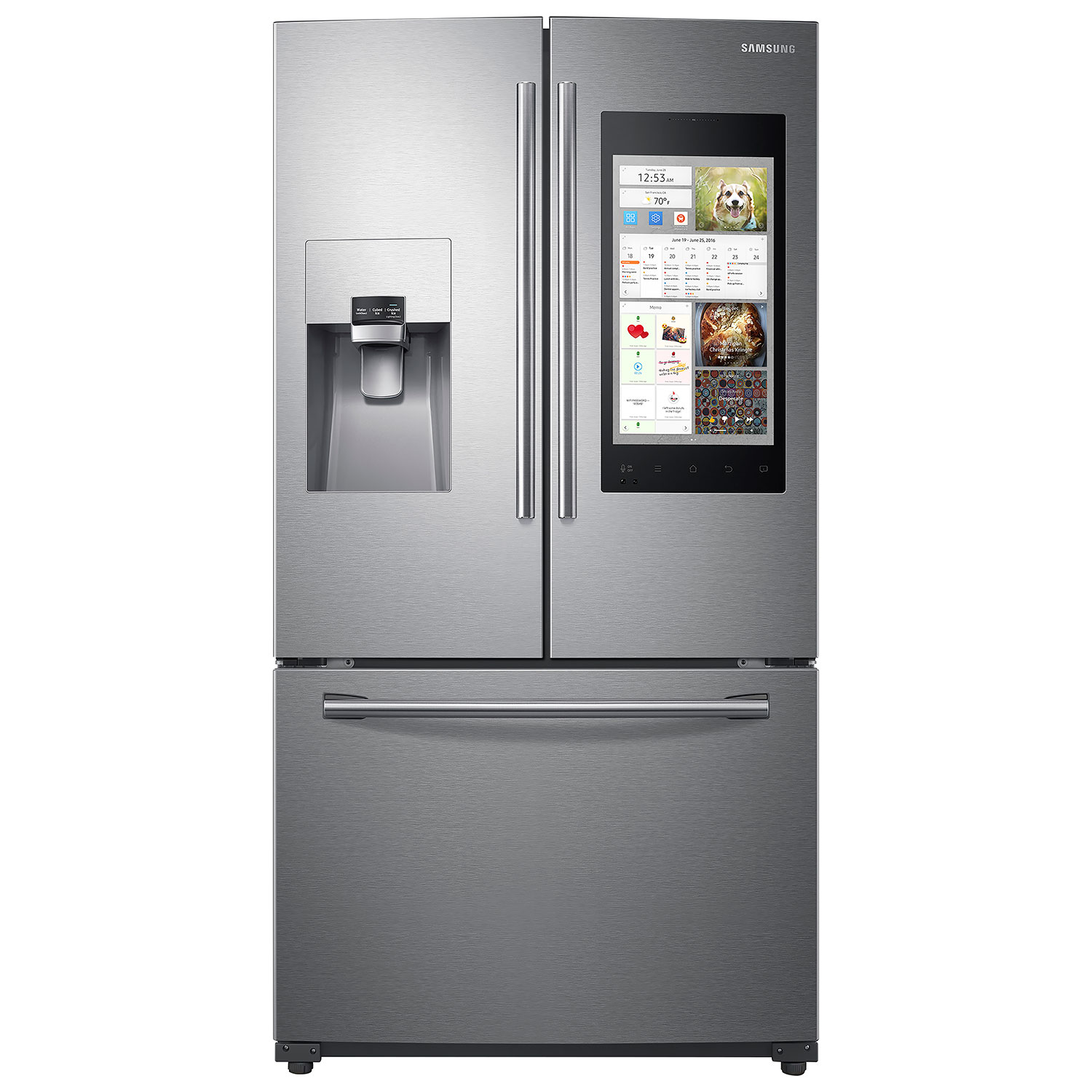
Smart refrigerators
A type of refrigerator that is typically in the side-by-side or French door format, smart refrigerators have features like built-in Wi-Fi, touchscreens in the door, and even cameras inside that allow you to view the fridge interior from a smartphone app to keep track of what’s there and what you’re running low on. You can even control settings remotely, receive an alert if the door is left open, troubleshoot issues, get updates on when maintenance is needed, and more. The latest smart fridges even boast fun colour and light shows or customizable colours, can play music, and reply to voice commands.
Choosing the right size and dimensions of a refrigerator
While you might absolutely adore that gorgeous stainless steel French door refrigerator, if it won’t fit neatly in your kitchen, or one side of the door will block an entryway when open, you might have to reconsider. Choosing the right size but also dimensions and door design are crucial when selecting a fridge.
Here are the steps you should take before deciding on a new fridge.
Measure the space
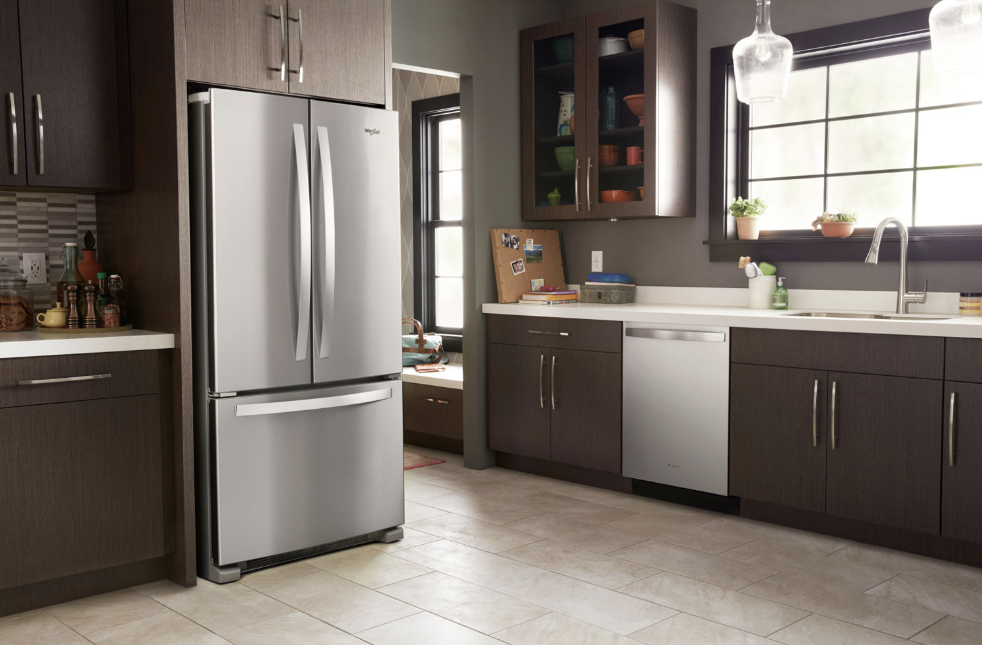
Use a tape measure and measure then jot down the height, width, and depth of the space where you want to put the fridge. Don’t forget to account for things like ventilation space, door clearance, and protruding fixtures, like a cabinet above the fridge or the space to plug the fridge into the nearest outlet. Once you have these measurements, you can run a search on the BestBuy.ca website that only meets these parameters, instantly narrowing down the hunt. It helps to put down painter’s tape to visualize how a fridge will look in the space once you have the dimensions of the one you have your eye on.
Measure the clearance for fridge doors
Also consider the length of the fridge doors when open and visualize that in the room to ensure that the door won’t hit a counter off to the side when it opens, for example, or a door that leads to your backyard. If the door can’t open all the way, you won’t be able to enjoy your fridge as much as you should. You can find this measurement on Bestbuy.ca under the Details and Specs tab of each refrigerator model’s listing. Here, you’ll be able to find the exact measurement of that fridge’s depth with the doors open as well as closed.
Measure your door
It sounds silly but if you have an old home with narrow doorways, you’ll want to make sure the refrigerator can make it through your front (or back) door and to your kitchen without getting stuck. So, pay attention to the dimensions of the box that the fridge comes in as well.
Make sure to leave space to walk
While you might believe that a fridge will fit if it fits the dimensions, take into account things like, as mentioned, the fridge doors once they are open. The kitchen still needs to have room to walk and to ensure that someone isn’t smacked in the face as they walk by at the same time you open the fridge door. Also consider that the doors don’t open and impede counterspace or clearance space to access other small or large appliances.
Capacity
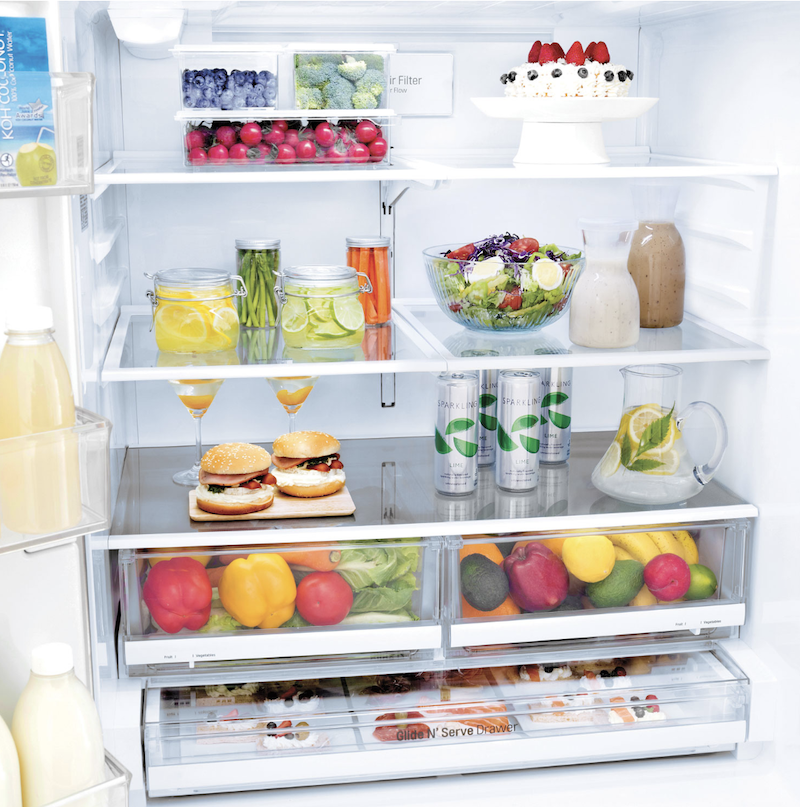
Choosing a fridge involves the delicate balance of finding one with enough space to accommodate your needs while still being compact enough to not dominate your kitchen. Small households might be able to make do with a smaller fridge, but if you have a large family or tend to cook and bake a lot, you might want something with more interior space. This is where designs like door-in-door, built-in, and compact depth fridges can come in handy, maximizing the space you have while still providing enough room to accommodate your refrigerated goods.
Leave room around the fridge
Overall, you want to make sure there’s sufficient room around the fridge, including both behind it and above it. this will ensure proper ventilation. If a fridge can’t ventilate properly, it might not function well over time. This can also potentially damage the motor or compressor or make the fridge work harder to keep your food sufficiently cool, thus inflating your energy bills unnecessarily.
The importance of energy efficiency
One of the most important features you should look for with a refrigerator today has nothing to do with the design, features, and functions, but rather energy efficiency. Choosing an energy efficient refrigerator, characterized by the Energy Star logo as well as other built-in features that help ensure efficient operation, is crucial for a few reasons.
Environmental impact
An energy efficient refrigerator will help you do your part in reducing your environmental impact and carbon footprint. This will, of course, help lead to a healthier planet overall. If you have an ancient refrigerator in your basement or garage, it could be using far more energy than you realize. Upgrading it to something simple yet energy efficient can make a world of difference.
Cost savings
This difference will not only be noticed in terms of a reduction in your carbon footprint, but also a nice break for your pocketbook. Did you know that refrigerators are one of the biggest energy hogs in the home? They must run 24/7 to continuously keep your food cold and, with a freezer, frozen, at a safe and consistent temperature. An energy efficient refrigerator doesn’t use as much energy, reducing your electricity bills in turn. Over time, this adds up to significant savings you can use to buy food to fill that energy efficient refrigerator and feed your family.
Key features to look for in a refrigerator
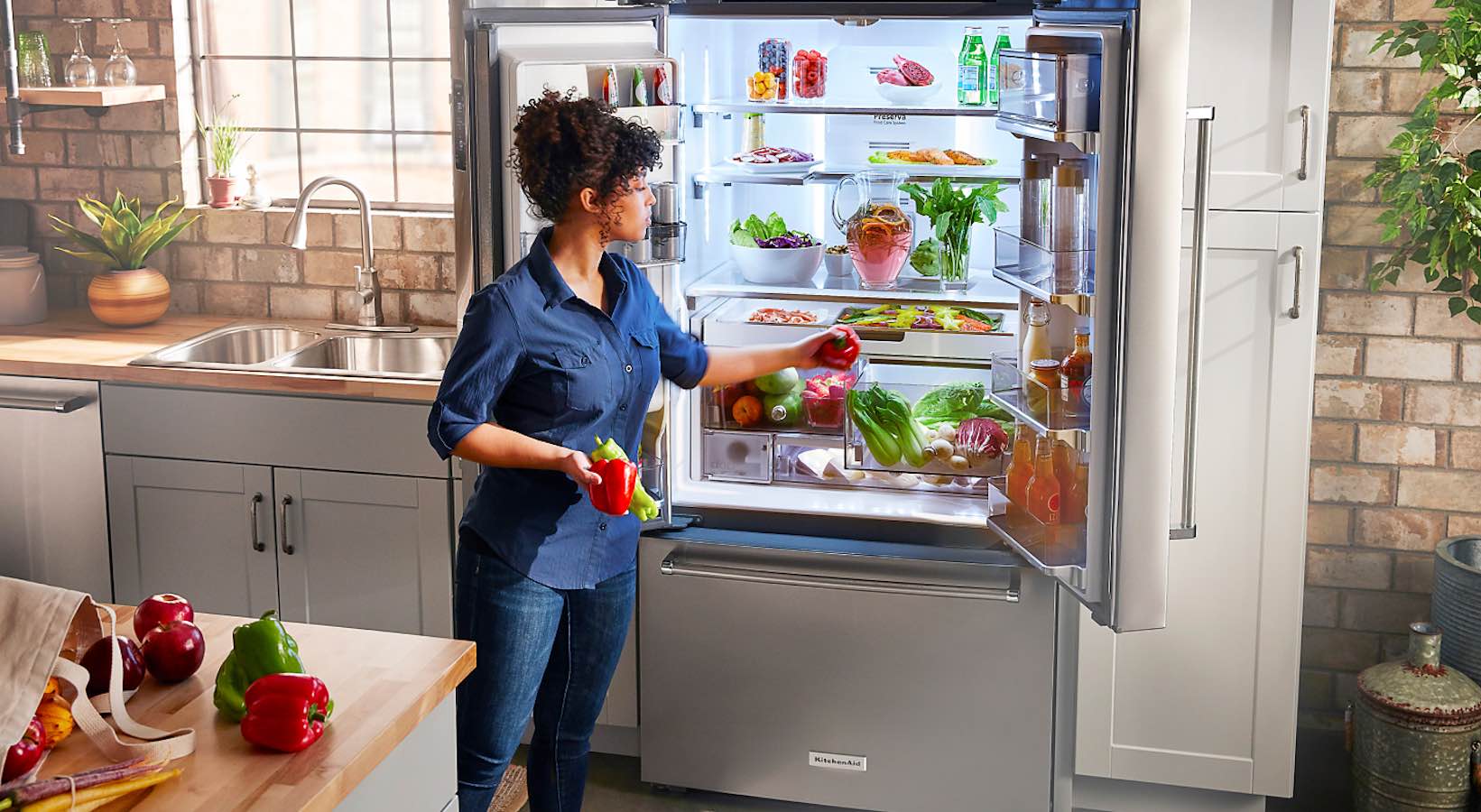
Now that you have decided on the style of refrigerator you want and the size that will fit in your kitchen, it’s time to consider the interior and what features will be most useful for you.
Adjustable shelves
Being able to adjust the shelves can make a big difference for families who like to buy different types of food and drinks, who entertain, and who appreciate organization. If you can push a middle shelf back, for example, this allows you to fit taller jugs of milk and juice, for example, keeping them upright. Being able to adjust shelves to accommodate larger items is useful, too, if you need to store a birthday cake for a kid’s party, for example, or a big fruit and veggie platter for a gathering. You can customize the interior based on your storage needs at any given time.
Temperature controls
Fridges that have temperature controls can help keep your food fresher longer while also saving you money in the process. This might include things like temperature-controlled crispers, or a fifth middle drawer you can adjust to accommodate what you are storing inside. Especially for fresh meat, poultry, and fish, deli meat, fruits, and vegetables, temperature controls can extend the life and keep them all at the proper and ideal temperature for storage.
Crispers
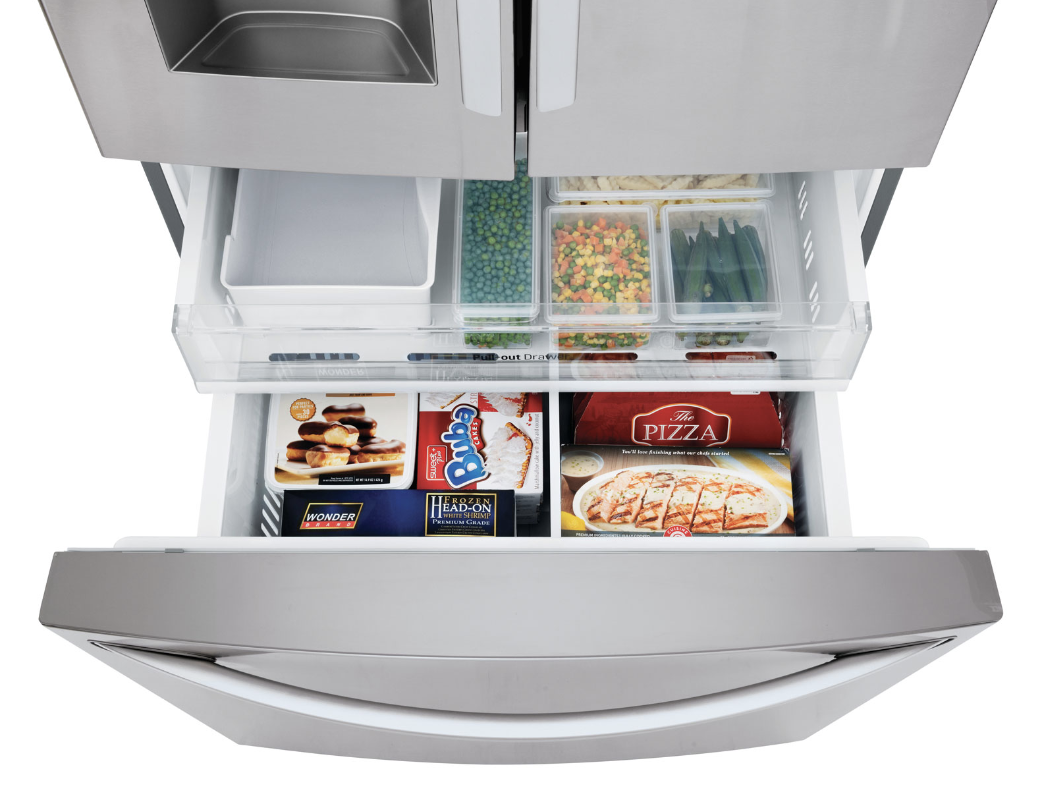
Having crispers in general is a great way to extend the life of fruits and vegetables that should be refrigerated. This helps maintain freshness while also allowing you to keep your fridge neat and organized. As noted, crispers with temperature control allows you to adjust based on whether you have navel oranges inside, fresh strawberries and blueberries, or carrots, celery, and asparagus.
Ice and water dispensers
Some fridges come with built-in water and ice dispensers. You’ll use this more than you realize. Not only is it a simple way to get fresh, clean-tasting filtered water, it also helps reduce your need for bottled water. Not having to keep a pitcher of filtered water in the fridge also opens more space inside. Keep in mind that you’ll need to connect the fridge to a water line. Some of the latest refrigerators can dispense both ice cubes and crushed ice, and some even dispense adorable little spheres of ice, perfect for cocktails and cool presentations. Note that you will need to buy and replace the filter a few times per year. Note, also, that some fridges have the ice and water dispenser mechanism inside, which can take u interior space. Some of the latest more premium models integrate the dispenser unit into the door so you don’t lose any interior space.
Door alarms
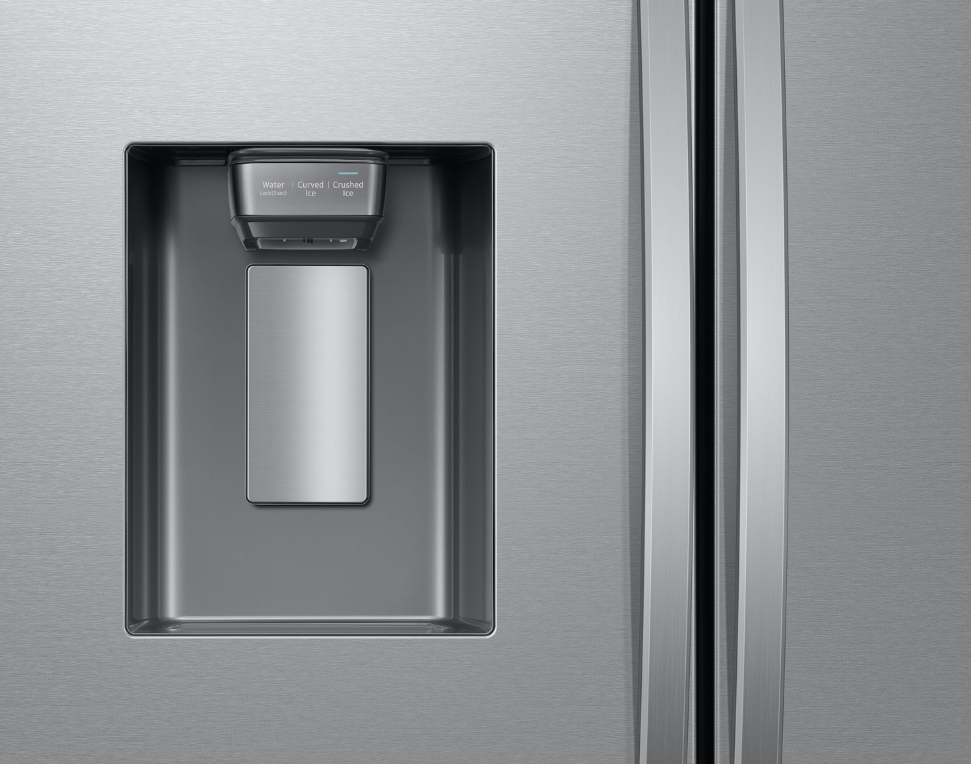
An easy way to spoil food or waste energy is to leave the fridge door open for an extended period of time. This is necessary if you’re refilling it from a big grocery day, but some family members tend to leave the door open longer than they should. Many of the latest fridges have features that will rapid cool the interior once you close the doors so it gets back to the proper temperature more quickly. But if a child forgets to close it, or your spouse loves to leave the door open while he makes an entire sandwich, a door alarm is a nice reminder to keep it closed. This, as noted, helps not only conserve energy but also prevent food spoilage from constant changes in temperature, especially if the door is being opened and closed repeatedly by different members of the family.
Defrost cycle
For refrigerators with freezers, a defrost cycle used to be a cumbersome process. You had to empty, unplug, and let the fridge warm up to melt away ice, then plug it back in and let the fridge get cold enough to refill the food. Nowadays, however, the latest fridges have automatic defrost cycles that make the process seamless. Make sure to check if the one you are thinking of getting includes this feature.
Smart refrigerators with advanced features
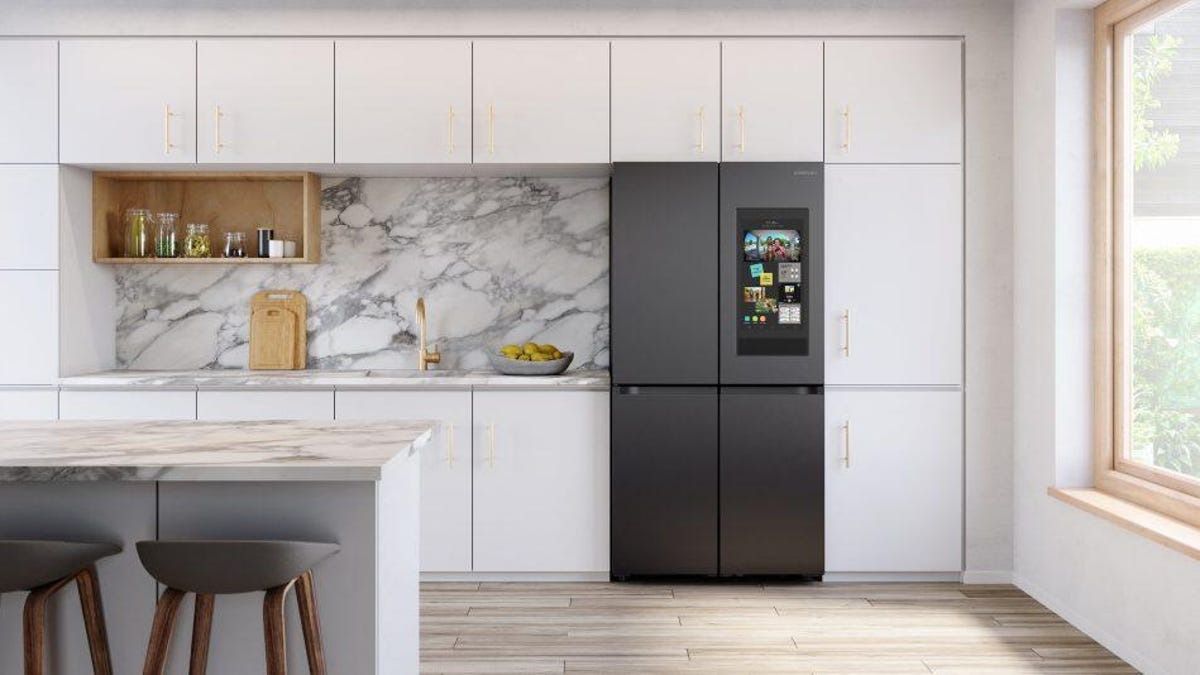
The latest innovation in refrigerators is smart refrigerators, which include Wi-Fi connectivity and other high-tech features to benefit you in numerous ways, especially if you already have plenty of smart home devices.
Wi-Fi technology
With built-in Wi-Fi, you can control and monitor a smart fridge remotely (seeing the temperature, for example or receiving relevant alerts). You can access the Internet from a touchscreen on the front, stream music, and more. The fridge basically becomes a hub for your daily life. You can leave digital notes for family members, check the weather and calendar, and more.
Touchscreen displays
As noted, smart fridges have a touchscreen display on the front that’s sort of like a permanent tablet in the kitchen. Use it to add items to a grocery list, watch TV or cooking videos, access recipes, control music playback, and more.
Internal cameras
Some smart fridges have cameras inside you can tap into while out at the grocery store, for example, to see if you need more milk or what the juice or condiment supply looks like. It’s a great way to avoid buying something you don’t need that might end up being wasted or conversely, having to make a second trip because you forgot something you did need and forgot to put on the list.
Smart home integration
Smart fridges can also function as part of your overall smart home. Sync it with voice assistants like Amazon Alexa or Google Assistant (based on compatibility) to control the touch display and Internet connectivity hands-free. Maybe you’re deep into making homemade burgers and want to pause the recipe on screen so you can wash your hands and grab the next set of ingredients. Perhaps you need to know how many ounces is equivalent to 500 grams while measuring; or maybe you want to pause the music because you have a calling come through. You can do this all hands-free, with the fridge as your hub and kitchen companion.
Lifestyle considerations
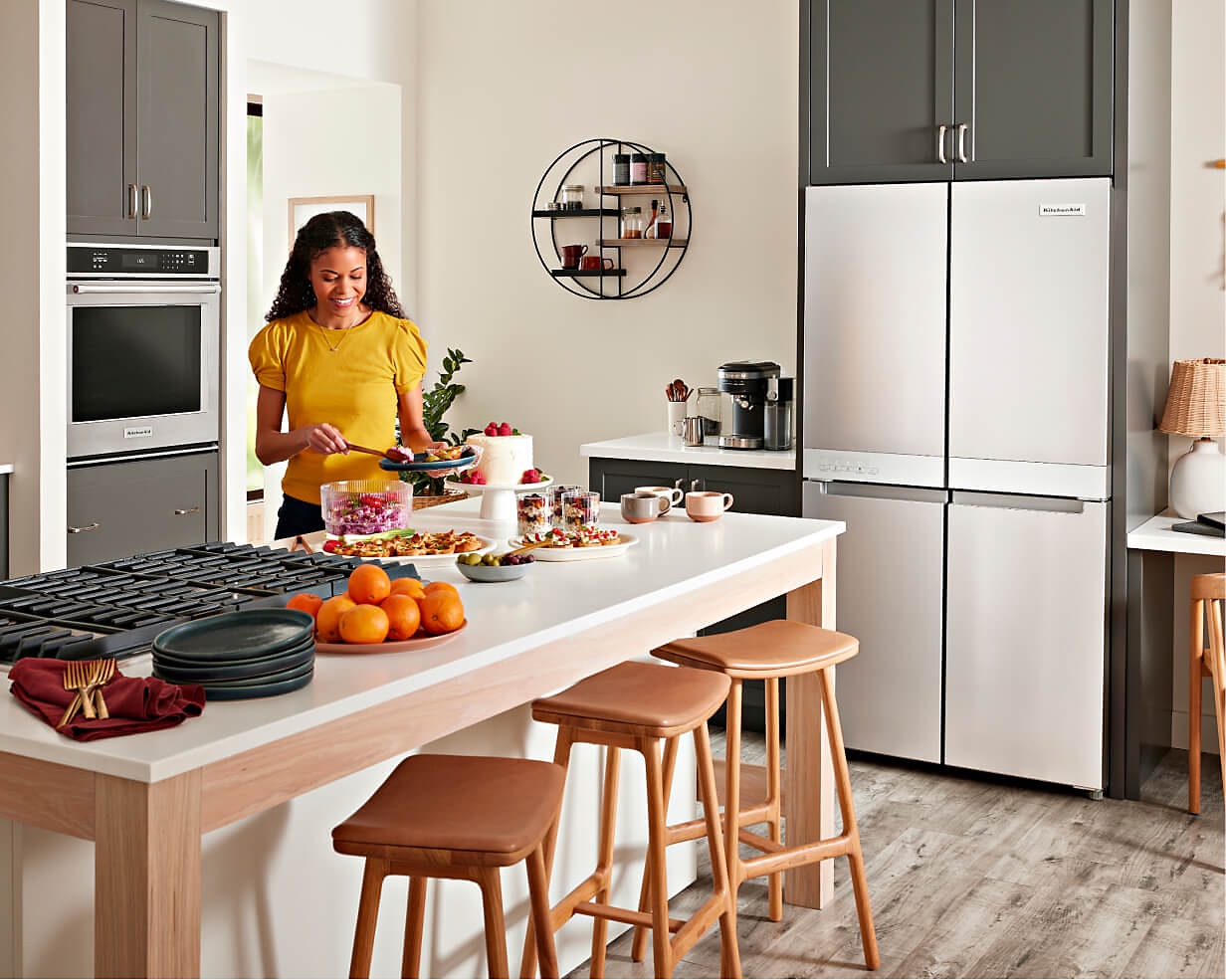
Now that you have the basics covered, before you decide on the right fridge, there are some lifestyle considerations to keep in mind. These might be overlooked considerations, but ones that could be a deciding factor once you take them into account.
Dietary habits
What you eat and how often might impact the type and style of refrigerator you choose, or at least the features that you deem most important. For example, if you’re vegan or vegetarian, you might want the best, most spacious crispers to hold fresh fruits and vegetables since you’ll likely often have plenty of those. You’ll also want to be mindful of choosing a fridge that has temperature controlled crisper drawers to keep these eats fresher, longer.
Meanwhile, meat lovers might focus on fridges with larger freezer space and better organized drawers (or even separate drawers/spaces) in the freezer to keep frozen meat and poultry nicely organized and separate from other frozen foods. Or, this could convince you to opt for an all-fridge refrigerator for the kitchen and a deep freezer for the garage.
Cooking frequency
If you cook often and tend to get groceries weekly, you’ll need ample space for both fresh perishable groceries as well as things like leftovers. In this respect, you’ll want to look for a fridge with a bigger overall interior size (provided it can fit in your space), and fridges with features to maximize space, like adjustable shelves and door-in-door designs.
Entertainment
For families or individuals who entertain a lot, you’ll want a fridge that has extra room for things like soda cans, wine bottles, large party trays, and more. You might also want to consider a secondary fridge so you have overflow space for items you need whenever there’s a large gathering.
Aesthetic considerations
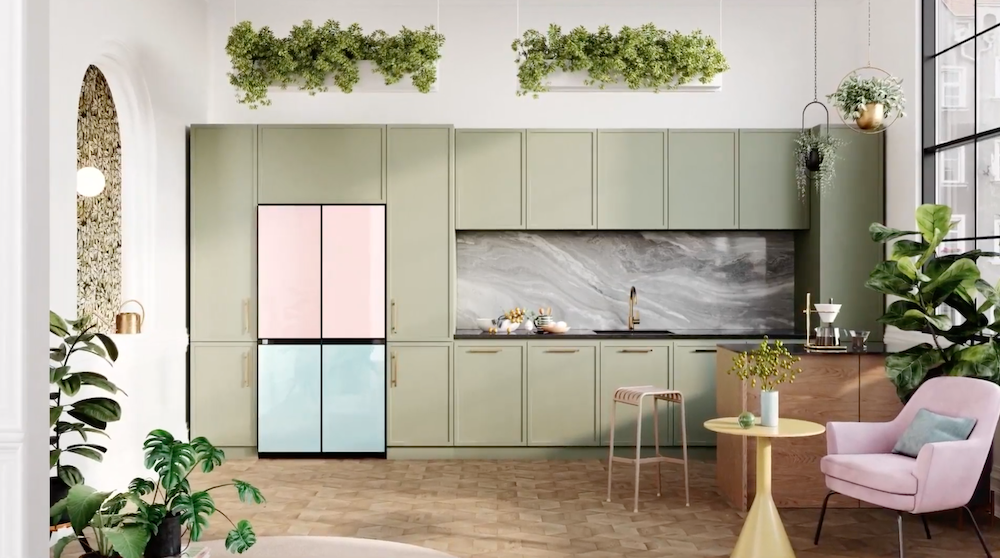
The last, but certainly not least, thing to keep in mind is how the fridge will look in the space. This goes beyond just how it physically fits, but the finish and style as well.
Finish and colour
You can find fridges in white, black, silver, and other colours, and in stainless for a more refined look. Whichever colour and finish you choose, it should match with the overall kitchen aesthetic. If you have other black stainless appliances, for example, keep the look consistent with a black stainless fridge. Conversely, if your other appliances are a crisp white, stick with that for the fridge, too (unless you’re planning to upgrade everything over time).
Also keep in mind that each finish type and material will require unique cleaning. If you opt for stainless steel, for example, you’ll want to find something that is fingerprint- and smudge-resistant, especially if you have lots of kids in the house. Know what you’ll need for cleaning, like a special stainless-steel cleaner.
With fridges like the Samsung Bespoke line, you have the option of customizing the look and colour schemes of the panels, even changing it up if you decide to redecorate the kitchen. This is something worth considering if you plan to remodel again in a few years and don’t yet know what colour scheme you might want down the line.
Handle styles
You’ll find either protruding or recessed handles, Which one you go with is purely a matter of design preference. Try both out to see which feels more natural and comfortable. It’s a small detail but one that shouldn’t be overlooked.
Integrating with cabinets
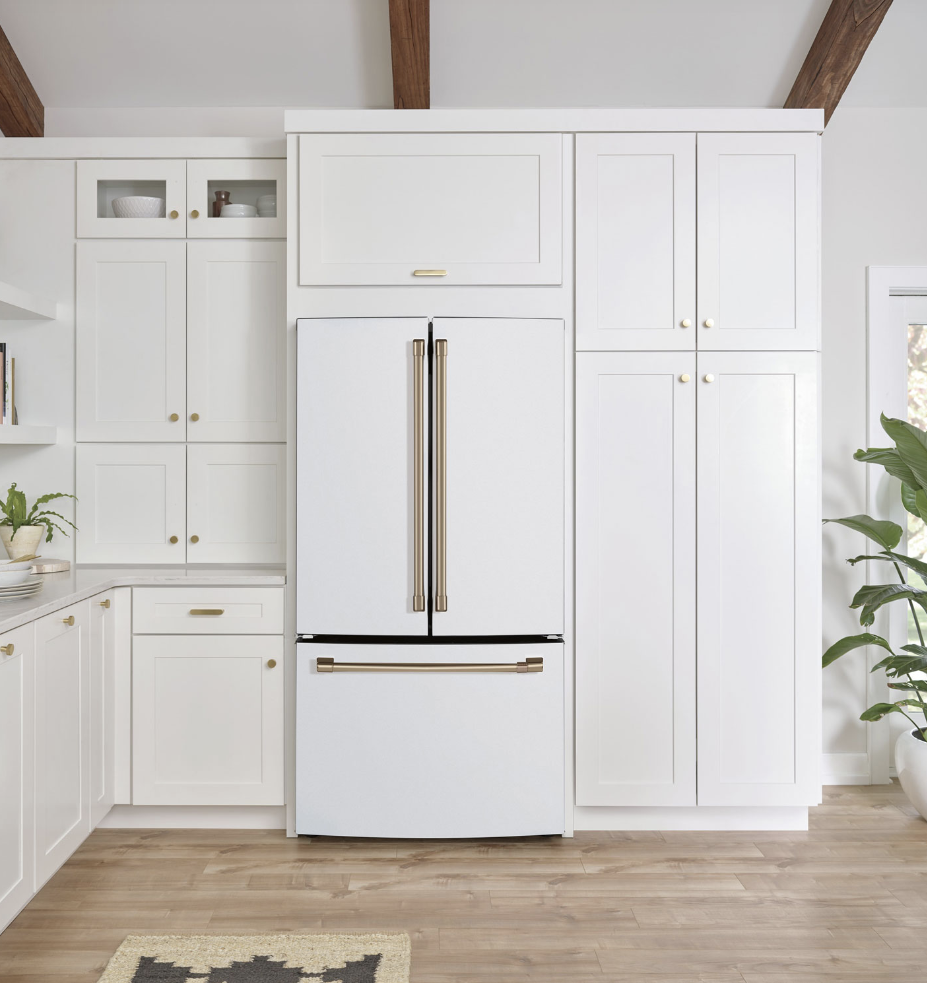
If you decide to do a full kitchen remodel and you want to go the built-in route, make sure that you can get the fridge with a matching finish to your cabinets and that it fits with the overall aesthetic.
Take the next step
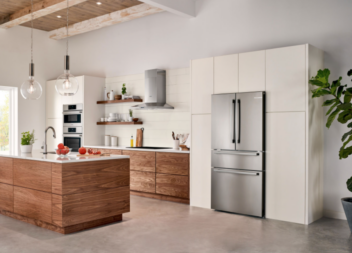
Run through this buying guide once more, jot down your desires, take measurements, and you’re sure to find the perfect fridge for you and your family. Then, visit Best Buy online to browse through the wide selection of refrigerators.







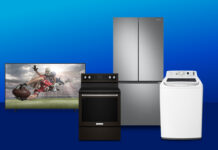
all of this refrigerator has there top cooling and beautfutuil design but top freezer are economy used in people
Thank for the very informative & helpful article. I’m 77 and haven’t had to buy a new ‘fridge for 38 years. There are so many models on the market I was getting stressed just trying to decide which one to buy. Your article helped me narrow it down. I have chronic back problems & would like one with easy access.
Although I live alone, I like to make soup & casseroles to freeze in individual serving size. I am almost vegetarian so want adequate room for lots of fresh vegetables. I would like counter-depth just because it would be so easy to reach food in the back. I want the ‘fridge items to be up higher to avoid having to bend to the crispers. The location is open so all dimensions are okay. French doors would be the nicest as they would open with convenience. All these matters & more were addressed and helped me make my decision to buy a French door, lower freezer & hopefully a counter depth ‘fridge. Thank you. Judith Bradley, Prince George, BC Canada
Hi Judith,
Our aim with our buying guides is definitely to help customers like you make their purchasing decisions so I’m so glad you found this one helpful and that it made it easier for you to choose a new fridge! Thank you for letting us know and I hope your new fridge serves you well 🙂
Comments are closed.